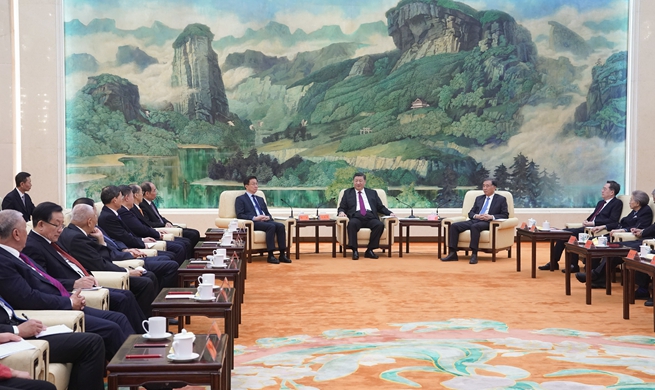by Nick Kolyohin
JERUSALEM, Jan. 15 (Xinhua) -- There is a global shift in paying with digital wallets instead of the traditional wallets and the use of credit cards, said Arik Shtilman, CEO and co-founder of Rapyd, a global fintech organization.
Shtilman was a keynote speaker at "The Future of Money" conference held in the Israeli coastal city of Tel Aviv on Monday.
The conference was organized by the leading Israeli financial newspaper Calcalist in collaboration with Israel's Bank Hapoalim.
There were about 800 participants, among them entrepreneurs, investors, senior executives of the finance industry, venture capital funds, insurance companies, and financial technology companies.
The keynote speakers at the event emphasized the global transition of the money system from the physical world into the computers' reality, where the possibilities for innovation are enormous.
The technological companies became a significant player in the realm of financial institutions, and they even have the potential to overcome the traditional banking system.
Banks from the other side are joining power with financial technology start-ups and becoming themselves kind of technological companies.
The boundaryless virtual world could enable the traditional local banks to become international scaled up players on the global stage.
New cooperations between banks, credit card companies, start-ups, and technology companies introduce innovative services, platforms, and applications for the consumers.
Big technology companies are replacing the more traditional ways of payment, paving the way to the future without the need for real money made of real-world materials.
Although people are becoming more connected to money applications than banks, the last ones still will be needed to move the money safely around the world, Shtilman told Xinhua.
"The regulation in every country is different, and the regulators want to control how money moves, especially because of taxes and money laundering aspects," stressed Shtilman.
This is the main reason why the money movement is not simple, because "money movement has a lot of negative effects also, and governments want to control it," said Shtilman.
While private ventures are trying to make dominating digital currencies, Shtilman predicts that governments are going to issue their internal digital money, which is going to replace the old currencies.
Ilanit Madmoni, head of innovation in the financial technology unit at Bank of Israel, said there would be many changes in the banking system in the coming future.
There will be much more variety of payment methods, and the big tech companies would probably offer their apps in Israel, "I'm sure that everything can change here," Madmoni told Xinhua.
Banks are afraid of the big technology companies, who have all the technology, money which makes them able to compete with the banks on the same level, said Madmoni.
The vision of Madmoni is that will be a constant reduction of the use of cash and plastic credit cards, "which is better for the economy," however, the system behind it will remain just in the virtual world.
Saar Zacharish, chief digital officer of Israeli Bank Hapoalim, said that the new payment applications have been adopted fast and expected to move into more fields of daily life.
Israeli banks in recent years launched digital wallets, which are applications on the cellphones that enable the user to transfer money to each other with a few clicks on the phone.
"Banks will have a very significant role in the future, and the banks already have a relationship with the customers. Assuming we can deliver on a very convenient experience, we will be there and lead the revolution," said Zacharish.
Nowadays, the banks are competing with high tech over the same talented workers, "the biggest challenge for us as banks is to recruit the best talent," Zacharish told Xinhua and added.
"We're turning into a technology company, and the key success factors in terms of delivering these products is having the best people work with us," Zacharish said.
But all the progress is also coming with challenges, said Michael Reitblat, CEO and co-founder of Forter.
"Almost every new system that's developed a new currency or new platform attracts first enthusiasts and fraudsters, and only if it survives, it starts to attract other people."
Reitblat is managing a fraud prevention company, and according to him, the new payment technologies scale up the amounts of money criminals could potentially steal if it is not protected good enough.
Another fraud prevention start-up that participated at the convention was Paygilant, whose CEO, Ziv Cohen, told Xinhua that its services detect the biometrical behavior of the customers.
Applications that use Paygilant products could identify when somebody else instead of their costumers trying to send money or do some other sensitive action without permission.
In the virtual world, our biometrical parameters and individual behavior leave a unique digital signature that probably even we would not recognize. Still, our digital guards could do that for us.

















